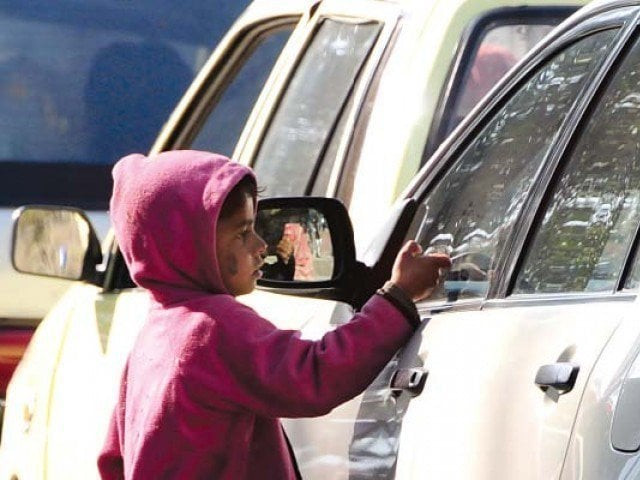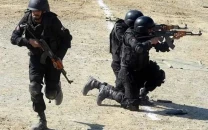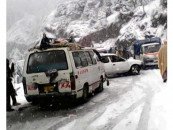Begging ban : Panhandlers continue to thrive
Despite several operations against alm-seekers, it is business as usual with professionals back on roads

Braving the cold with shawls wrapped around them, despite the begging ban, beggars have made various Bus Rapid Transit (BRT) terminals and traffic signals in Peshawar their daily place of work.
Women with children in tow, elderly men, and amputees alike are all part of a group of 1,463 people who beg professionally and are regularly transported to the major commercial centers in the city as per a recently submitted report to the Comissioner of Peshawar. Either due to the inflation or the devaluation of currency these panhandlers, however, do not accept coins.
“No, I do not take this. Do not give me coins, give me actual money if you want to give seriously,” said Akbar, an 80-year-old man sitting on the footpath, curled up inside his shawl, outside a BRT terminal.
A little further down from Akbar, was a woman sitting at the entryway of the BRT Terminal Gulbahar, with her child sleeping by her side, similarly rejecting coins - a regular at the station as per residents. “It is not only men and women, there are infants and teenagers as well who regularly ask for money around this area,” said Muhammad Irshad Khan, a resident of the Hayatabad area. According to Khan, on his daily commute from Khyber Bazar to Hayatbad, he stops at the busy Peshawar Garrison traffic signal and knows most of the alm-seekers there by face. “They are all professional and have been there for as long as I can remember. They disappear during these operations against panhandlers but then appear again like nothing happened. The government is least bothered about getting them off the roads,” he said.
Shahida, who is one of the beggars on the busy Garrison traffic signal, while talking to The Express Tribune, gleefully remarked, “we request people and they mostly do not refuse us money.” Candidly talking about her daily earnings and her currency notes only policy she said that on average she makes Rs 1,000 per day and can easily run her household. “If 100 people give a Rs 10 note each, it makes Rs 1000 a day which is more than the minimum wage announced by the government,” explained Shahida.
When asked about the ban against begging, while laughing, she matter-of-factly stated: “Being female, and that too in a society where women cannot be touched, the authoirities just ask us to leave. We leave and come back again. It is an edge women have.”
Recently, an operation was launched against beggars in the city like Akbar and Shahida, and their makeshift huts on the outskirts of the city were bulldozed. About 808 cases were registered against adult panhandlers but the children were sent to Zamung Kor for shelter, an institute for state children by the Khyber Pakhtunkhwa (K-P) government. “We found out that 21 professional beggars had been installed by contractors. A mafia was found involved in begging which collects thousands of rupees from panhandlers deputed at many places including commercial plazas and bus stops,” a senior official at the district administration told The Express Tribune, under the condition of anonymity. The official also informed this reporter that the contractors were arrested and charged under relevant sections of the law but most of them were out and about now since they had get their bail applications approved instantly.
Commissioner Peshawar, Riaz Mehsood, when inquired about the operation and arrests, confirmed the developments but assured that his department was on top of the problem. “We have successfully rooted out 90% of the professional beggars but there are still areas where they continue to operate and we are pursuing them. We will never let this mafia flourish,” Mehsood told The Express Tribune.
Published in The Express Tribune, January 03, 2022.



















COMMENTS
Comments are moderated and generally will be posted if they are on-topic and not abusive.
For more information, please see our Comments FAQ